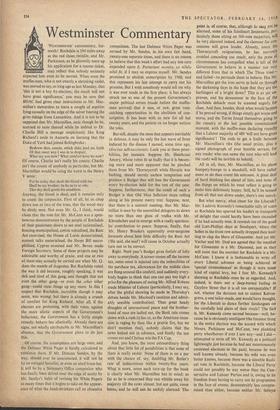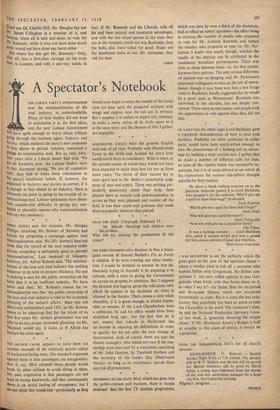Westminster Commentary
'WESTMINSTER' commentary, for- sooth Rochdale is 194 miles away as the red shoes twinkle, and Mr. Parkinson, as he gloomily tears up his application for a season ticket, may reflect that nobody seriously expected him even to be second. When even the muffin-man, who is not exactly a shrinking violet, was moved to say, as long ago as last Monday, that 'this is not a key by-election; the result will not have great significance,' you may be sure that BOAC had given clear instructions to Mr. Mac- millan's stewardess to leave a couple of aspirins lying casually on the edge of the salver bearing the grim tidings from Lancashire. And it is not to be supposed that Mr. Macmillan, stoic though he be, scorned to taste thereof while he indited to Dr. Charlie Hill a message suspiciously like King Richard's aside to Aumerle on learning that the Duke of York had joined Bolingbroke : Beshrew thee, cousin, which didst lead me forth Of that sweet way I was in to despair; What say you now? What comfort have we now? Of course, Charlie isn't really his cousin; Charlie isn't the cousin of anybody in particular, but Mr. Macmillan would be using the word in the Henry V sense :
For he today that sheds his blood with me Shall be my brother; be he neer so vile, This day shall gentle his condition.
Anyway, the blood is shed, and it remains only to count the corpuscles. First of all, let us chop down one or two of the trees, that the wood may be dimly seen. Not even Mr. G., 1 think, would claim that the vote for Mr. McCann was a spon- taneous demonstration by the people of Rochdale of their passionate desire to see steel nationalised, housing municipalised, cotton subsidised, the Rent Act exorcised, the House of Lords democratised, summit talks materialised, the Shops Bill necro- philised, Cyprus enosised and Mr. Bevan made Foreign Secretary. Some of these projects may be admirable and worthy of praise, and one or two of them may actually be carried out when Mr. G. dons the mantle of Augustus. But Rochdale voted the way it did because, roughly speaking, it was sick and tired of this gang,• and thought that not even the other gang—or even the other other gang—could mess things up any more. In this I suspect that Rochdale, incredible though it may seem, was wrong; but there is already a crumb of comfort for King Richard. After all, if the electors are protesting, with their votes, against the more idiotic aspects of the Government's behaviour, the Government has a fairly simple remedy; behave less idiotically. Already there are signs, not wholly attributable to Mr. Macmillan's absence, that the Government plans to do just this. • ,.Of course, the assumptions are large ones, and the Defence White Paper is hardly calculated to reinforce them. If Mr. Duncan Sandys, by the way, should ever be assassinated, it will not be by an enraged Socialist, or even an axed brass-hat. It will be by a Stationery Office compositor who has finally been driven over the edge of sanity by Mr. Sandys's habit of revising his White Papers so many times that it begins to take on the appear- ance of what the head-shrinkers call an obsessive compulsion. The last Defence White Paper was revised by Mr. Sandys, in his own fair hand, twenty-one separate times, and there is no reason to believe that this week's effort had any less care expended upon it. Parturiunt montes, ex nihdo nihil fit, if I may so express myself. Mr. Sandys promised to abolish conscription by 1960, and this represents his last attempt to carry out his promise. But I wish somebody would tell me why it was ever made in the first place; it has always struck me as one of the present Government's major political errors (made before the muffin- man arrived) that it sees, or saw, great vote- catching opportunities in the abolition of con- scription. It has been with us now for all but twenty years, and the patient ox no longer notices the yoke.
But still, despite the mess that appears inevitable in defence, it may be only the last wave of fever induced by the disease I named, some time ago, idiocitas salkvaccinentis. Look you at these possi- bilities, for instance. Suppose Mr. Heathcoat Amory, whose robes fit so badly that it is becom- ing more and more apparent that he pinched them from Mr. Thorneycroft while Horatio was bathing, should sternly eschew temptation and produce a Budget that will lose the Government every by-election held for the rest of the year. Suppose, furthermore, that the result of such a Budget is that Old Man Inflation stops rolling along at his present merry trot. Suppose, next, that there is a summit meeting, that Mr. Mac- millan is seen by the assembled delegates to down no more than one glass of vodka with Mr. Khrushchev and to emerge with a really spectacu- lar contribution to peace. Suppose, finally, that Mr. Henry Brooke's apparently over-sanguine forecasts about how little difficulty the Rent Act ('He said, she said') will cause in October actually turn out to be correct.
Right. Next year's Budget gives fistfuls of lolly away to everybody. A tanner comes off the income tax, some sense is injected into the imbecilities of the purchase tax, allowances for the middle class are flung around like confetti, and suddenly every- body begins to think that one can pay too high a price for the pleasure of seeing Mr. Alfred Robens made Minister of Labour (particularly, I may say, after the pitiful showing he made in Thursday's debate beside Mr. Macleod's cautious and admir- ably sensible contribution). Then great heady draughts of international peace and the brother- hood of man are ladled out, the Bank rate comes down with a rush (it has to, as the American reces- sion is raging by then like a prairie fire, but we don't mention that), nobody claims that the news leaked out in advance, and finally the sun comes out and Chelsea win the FA Cup.
And, you know, the most extraordinary thing about that little list of possibilities is that none of them is really exotic. None of them is on a par with the chance of, say, doubling Mr. Butler's rate of indiscretions within twenty-five years. What is more, some such turn-up for the book is clearly what Mr. Macmillan has in mind; as far as he is concerned they can whittle away his majority till the cows almost, but not quite, come home, and he will not be unduly alarmed. The point is, of course, that, although he may not be alarmed, some of his faintheart lieutenants, par- ticularly those sitting on 500-vote majorities, will be very alarmed indeed, and the clamour for con- cessions will grow louder. Already, anent the Thorneycroft resignations, he has narrowlY avoided conceding too much; only the press of circumstances has compelled what is left of the Government to behave in a manner not very different from that in which The Three tried— and failed—to persuade them to behave, Has Mr Macmillan got the iron nerve to hold on througb the darkening days in the hope that they are the harbingers of a bright dawn? This is as yet un- proven, and his demeanour in the face of the Rochdale debacle must be scanned eagerly for clues. And then, besides, think what would happen if he proved wrong, if things simply got worse and worse, and the Tories found themselves going to the country at the last possible constitutional moment, with the muffin-man declaring roundly that a Labour majority of 480 'will not have great significance'! The rush to get a knife between Mr. Macmillan's ribs (the usual prizes, plus a signed photograph of your humble servant, for any reader who can name the man who will lead the rush) will be terrible to behold.
All in all, then, Mr. Macmillan, as his plane bumpety-bumps to a standstill, will have rather more to do than count his suitcases. A great deal of hard thinking lies ahead of him, and none of the things on which he must reflect is going to make him deliriously happy. Still, he'll be tanned from all that sun down under, there's one mercy.
But what mercy, what cheer for the Liberals? Mr. Ludovic Kennedy's remarkable tally of votes at Rochdale has spurred his leaders' to transports of delight that could hardly have been exceeded if he had actually won. It reminds me of the good old Lort-Phillips days at Southport, where the ladies in the front row actually dropped their knit- ting to clap the Hero of Gloucester. And yet Mr. Vacher and Mr. Dod are agreed that the member for Gloucester is a Mr. Diamond, just as they will insist that the member for Rochdale is a Mr. McCann. I know it is fashionable to write off every Liberal advance as being achieved in 'special circumstances' as though it were some kind of capital levy, but I fear Mr. Kennedy's showing at Rochdale must be so regarded. And, indeed, is there not a deep-buried feeling in Gayfere Street that it is all too unrepeatable? If not, whence the decision not to contest Kelvin- grove, a seat tailor-made, one would have thought, for the Liberals to dance further fandangoes on the carefully laid plans of their rivals? The fact is, Mr. Kennedy came second because—well, be- cause he is obviously intelligent (the funniest thing in the entire election was the accord with which Messrs. Parkinson and McCann, two plodding party wheelhorses if ever I saw any—and I did— attempted to write off Mr. Kennedy as a political lightweight just because he had not monotonously contested elections in the past), because he was well known already, because his wife was even better known, because there was a sizeable Radi- cal vote in Rochdale, because the Liberal Party could not possibly be any worse than the Con- servative and Labour Parties and is, owing to its freedom from having to carry out its programme in the face of events, demonstrably less compro- mised than either, because neither Mr. Selwyn Lloyd nor Dr. Charles Hill, Mr. Douglas Jay nor Mr. James Callaghan is a member of it, and because, when all is said and done, to vote for Mr. Kennedy, while it may not have done much good, would not have done any harm either. But where has that got Mr. Kennedy? Only, after all, into a first-class carriage on the train back to London, and with a one-way ticket, at
that. If Mr. Kennedy and the Liberals, with all his and their natural and unnatural advantages, and with the two major parties in the state they are at the moment, could not win Rochdale, then the bells, alas, have tolled for good. Shake not thy handsome locks at me, Mr. Grimond; they toll for thee.
TAPER































 Previous page
Previous page